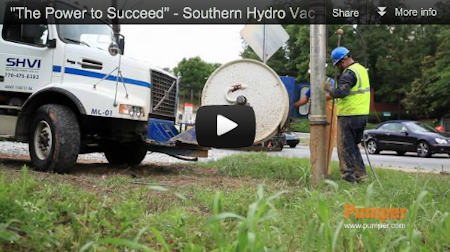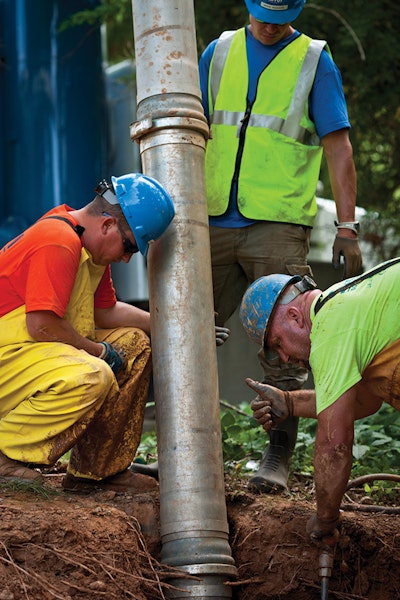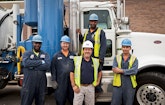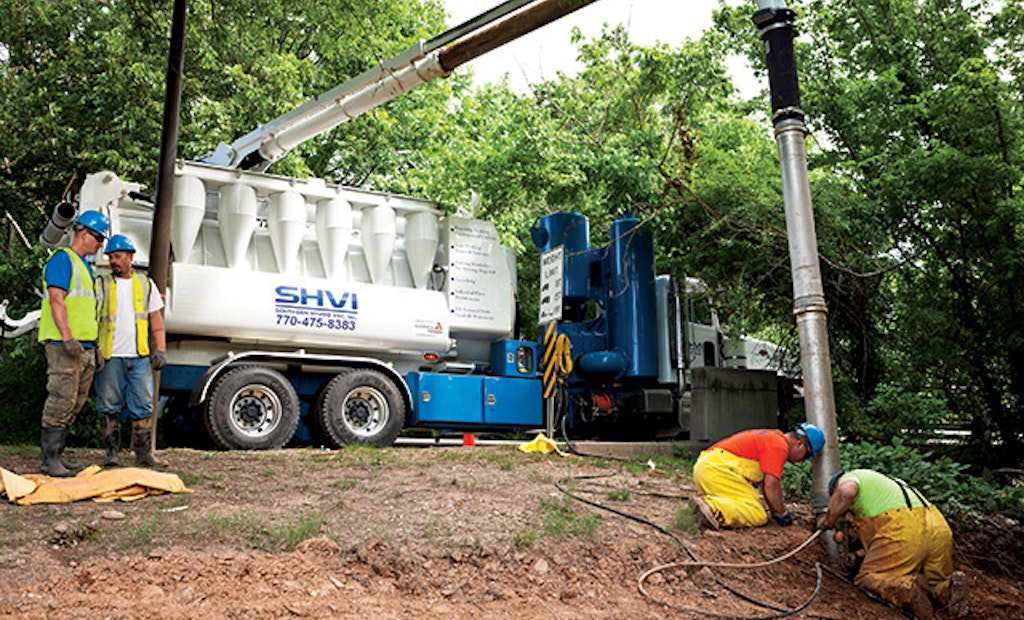Interested in Pumps?
Get Pumps articles, news and videos right in your inbox! Sign up now.
Pumps + Get AlertsTim Coleman was surprised by the speed at which his T.J. Coleman and Co. expanded as contractors laying fiber loops around the City of Atlanta needed a soft dig company to expose underground pipes and utilities.
The Roswell, Ga., contractor bought his first hydroexcavator in January 2000 and began digging trenches. By September, Coleman was running nine machines to keep up with demand. Hiring subcontractors brought the total to 14 trucks in October.
The 9/11 terrorist attacks and the stock market crash of 2002 collapsed some of the demand, but not Coleman. He reduced inventory by six machines, laid off some operators, found business partners, and launched Southern Hydro Vac in October 2003. Coleman, the firm's salesman, kept diversifying to create turnkey packages and having crack hydroexcavation crews learning on the job.
Besides servicing Southern Company and subsidiaries Georgia Power and Alabama Power, Southern Hydro Vac specializes in tackling the nastiest gravity-defying vacuum projects. Coleman's weapon of choice is a fleet of GapVax HX-44 and HV-56 hydroexcavators.
"Two things have made our reputation," Coleman says. "The capabilities of those trucks and my employees, who are responsible for all our repeat business." Revenue increased from $1 million in 2004 to $5.2 million in 2011.
HOLDING ON
T.J. Coleman catered to the construction industry, and Earth Development was a customer. When Coleman mentioned to owners Guy Rimoldi and Ed Morgan that he wanted to grow his business with a partner who could provide financial backing, they welcomed the opportunity.
A year after the partners formed Southern Hydro Vac, Coleman sold his first company and focused on trenching for contractors and utility owners, helping them install encased duct banks for power distribution and telecommunications cables, or municipalities laying new or replacement water, sanitary and storm piping.
The first trucks Coleman bought in October 2003 were a GapVax HX-44 and a GapVax MC-1510 combination sewer machine, both built on Volvo chassis. The crew on the sewer truck cleaned pipes and manholes, and removed silt from waterways, underground retention vaults, and aboveground retention ponds. The MC-1510 has a 9-cubic-yard steel debris body, 1,400-gallon water tank, 5,300 cfm/17-inches Hg Hibon positive displacement blower, and 80 gpm/2,000 psi direct-drive water pump.
Potholing and hydroexcavation work came through Georgia Power or construction contractors T.J. Coleman had serviced for 14 years. By May 2004, Coleman needed another truck and bought a 2003 HX-44. "The six machines we purchased since then have been HV-56s with 5,300 cfm/28-inches Hg Hibon positive displacement blowers," he says. Most are on Peterbilt chassis with 17-cubic-yard debris bodies, 1,200-gallon water tanks, and 19 gpm/3,000 psi water pumps. Today, hydroexcavation accounts for 90 percent of the business.
CLEARED FOR TAKEOFF
Southern Hydro Vac is one of a few soft dig contractors approved to work at the Hartsfield-Jackson Atlanta International Airport. "Through Holder-Manhattan-Mooney-Hunt, we did $1 million in 18 months when the city built the new international concourse," Coleman says. "First, we exposed utilities as they excavated a 15-acre hole 20 to 50 feet deep, then we dewatered it repeatedly."
The open excavation captured runoff, and the airport had nowhere to pump it. When it rained, work on the concourse would stop and Coleman's phone would ring. Two hours later, eight hydroexcavators were on site with crews working around the clock until it was safe for contractors to return to their jobs.
To service regular customers, Coleman rented two HV-56s from Dynamic Rental Systems near Houston, Texas. Meanwhile, back at the airport, contractors wanted to drive piling, but worried about hitting a 56-foot-deep sewer. Coleman had never dug to that depth before, but a GapVax engineer assured him it was possible.
To prevent the pothole from caving in, the crew sleeved the vacuum tubes with 18-inch PVC pipe. "The guys stopped a few times to bore through rocks, and wound up exposing the sewer at 64 feet," Coleman says. "That's our record depth, and I still find it unbelievable."
When contractors poured mud slabs (a 6-inch-thick layer of concrete to seal the soil) for service tunnels under airport buildings, Southern Hydro Vac cleaned the plastic waterproofing sheet beneath the installed rebar. "Laying rebar is a dirty process," Coleman says. "We would jet and vacuum the debris before they poured the bottom structural slab. The last mud slab we cleaned was 1,100 feet from the truck."
KEEP THEM RUNNING
The company's rapid expansion left Coleman uncomfortable with success. "My other company had six employees, was easy to control, and not very expensive to run," he says. "I never borrowed money to grow the business because everything was affordable."
That wasn't the case with hydroexcavators. Besides the hefty price tags, the cost of maintenance surprised Coleman. "When coupled with downtime, maintenance became very expensive," he says. "The solution was to do it on time and to fix equipment as soon as it broke. The only way to do that and get those trucks back out earning money was to have a shop."
After sharing Earth Development's facility for five years, Southern Hydro Vac moved to a 5,000-square-foot, three-bay shop on a 2-acre lot in 2008. Determined to achieve zero downtime, Coleman hired a full-time day mechanic, then a full-time night mechanic. They do everything from fabricating to swapping out power takeoffs, tires and electrical, and even replacing transmissions.
Another time saver was buying diesel fuel in bulk and storing it in a 1,000-gallon aboveground STI Fireguard tank from Southern Tank. "It's UL 2085 labeled so we can strategically locate it 15 feet from the shop," Coleman says. "While the trucks are fueling, crews clean them and restock supplies. That saves me an hour per day per crew." Buying fuel in bulk saves 5 cents per gallon.
INTO THE BREECH
As Southern Hydro Vac's can-do reputation expanded, construction companies such as Holder Hardin, Skanska, Harp, Tayco Contractors and others called Coleman with untried projects. "I was always honest and told them that I didn't know if the trucks could do it, but we would try," he says.
One project involved sinking an 11- by 16- by 25-foot deep elevator shaft at Atlanta's Gwinnett Medical Center. The crew pulled up to the loading dock with the HX-44 and ran the 6-inch aluminum vacuum tube 300 feet down a hall. They laid cardboard every 10 feet under the tube joints to avoid scratching the floor, then duct taped the joints to seal in the mud. After boring a hole through a wall to enter the proper room, they enclosed it in plastic to contain the dirt and sunk the shaft, all without shutting down that area of the hospital.
Another learn-on-the-job project began as potholing for utilities so Harp Excavating could sink doghouse (bottomless) manholes over sewers to add another line. "We had already sunk shoring, so I suggested we try to sink a manhole," Coleman says.
His crew arrived at 10:30 p.m., sank a 4-foot-diameter manhole 11 feet deep, then dug a 15-foot-long trench to bring in the new line. They finished at 4:30 a.m. "The contractor called the next morning almost in shock," Coleman says. "We accomplished in six hours what took him three days, and we saved him $10,000. Ever since then, we've been sinking manholes all over Atlanta."
SILVER LINING
In 2008, Coleman was ecstatic when officials from Southern Company, which owns multiple power utilities, asked him to work for them. However, they wanted a contractor with an experience modification rate below 1. "I had six employees in 2005 and a minor Workers' Compensation episode," he says. "That brought our EMR to 1.24 and the officials said no. It just about killed me because here was our chance to grow."
Coleman went to Georgia Power and built a safety program based on their requirements for contractors. "It made us a much better and safer company," he says. It took a year for workers to bring the EMR in line, at which point Southern Company put them to work. Southern Hydro Vac's 2011 EMR was 0.84.
Many projects required site preparation work done by other contractors. Coleman saw an opportunity for Southern Hydro Vac to become a one-stop shop for customers. "We offer traffic control, saw cutting, jackhammering, and covering plates and shoring for excavations,'' Coleman says. "Then we backfill them and restore the surface."
HELPING HANDS
The expansion was one too many irons in the fire for Coleman to handle. He hired a fleet manager in March 2012. The turnkey work also left Coleman shorthanded, so he hired three more workers. His biggest challenge was finding self-motivated people who would care about the company's reputation and take pride in their work.
"Sometimes we go through 10 prospects to find a good one," he says.
Although Coleman has tried three times, the worker he has been unable to replace is his wife. Her office duties include accounts receivable, collections and answering phones. "Tina has been with me since we opened T.J. Coleman in 1990," he says. "I can't do it without her. No one I've hired to release Tina from her duties takes care of the business like she does."












